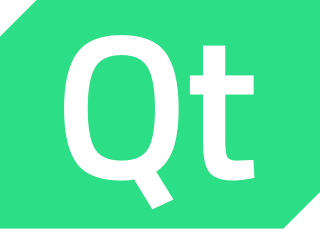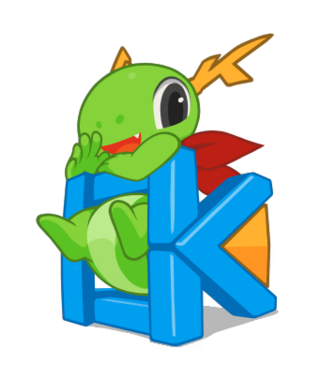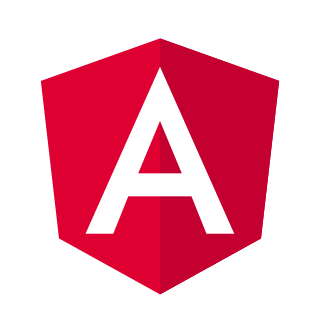Related Research Articles

Qt is cross-platform software for creating graphical user interfaces as well as cross-platform applications that run on various software and hardware platforms such as Linux, Windows, macOS, Android or embedded systems with little or no change in the underlying codebase while still being a native application with native capabilities and speed.
JScript is Microsoft's legacy dialect of the ECMAScript standard that is used in Microsoft's Internet Explorer 11 and older.
WebKit is a browser engine developed by Apple and primarily used in its Safari web browser, as well as all web browsers on iOS and iPadOS. WebKit is also used by the PlayStation consoles beginning from the PS3, the Tizen mobile operating systems, the Amazon Kindle e-book reader, Nintendo consoles beginning from the 3DS Internet Browser, and the discontinued BlackBerry Browser. WebKit's C++ application programming interface (API) provides a set of classes to display Web content in windows, and implements browser features such as following links when clicked by the user, managing a back-forward list, and managing a history of pages recently visited.

PyQt is a Python binding of the cross-platform GUI toolkit Qt, implemented as a Python plug-in. PyQt is free software developed by the British firm Riverbank Computing. It is available under similar terms to Qt versions older than 4.5; this means a variety of licenses including GNU General Public License (GPL) and commercial license, but not the GNU Lesser General Public License (LGPL). PyQt supports Microsoft Windows as well as various flavours of UNIX, including Linux and MacOS.
SCXML stands for State Chart XML: State Machine Notation for Control Abstraction. It is an XML-based markup language that provides a generic state-machine-based execution environment based on Harel statecharts.
TypeScript is a free and open source high-level programming language developed and maintained by Microsoft. It is a strict syntactical superset of JavaScript and adds optional static typing to the language. It is designed for the development of large applications and transpiles to JavaScript. As it is a superset of JavaScript, existing JavaScript programs are also valid TypeScript programs.
Qbs is a cross-platform free and open-source software for managing the build process of software. It was designed to support large, complex projects, written in any number of programming languages, primarily C/C++.
A single-page application (SPA) is a web application or website that interacts with the user by dynamically rewriting the current web page with new data from the web server, instead of the default method of a web browser loading entire new pages. The goal is faster transitions that make the website feel more like a native app.

PySide is a Python binding of the cross-platform GUI toolkit Qt developed by The Qt Company, as part of the Qt for Python project. It is one of the alternatives to the standard library package Tkinter. Like Qt, PySide is free software. PySide supports Linux/X11, macOS, and Microsoft Windows.

Symbian is a discontinued mobile operating system (OS) and computing platform designed for smartphones. It was originally developed as a proprietary software OS for personal digital assistants in 1998 by the Symbian Ltd. consortium. Symbian OS is a descendant of Psion's EPOC, and was released exclusively on ARM processors, although an unreleased x86 port existed. Symbian was used by many major mobile phone brands, like Samsung, Motorola, Sony Ericsson, and above all by Nokia. It was also prevalent in Japan by brands including Fujitsu, Sharp and Mitsubishi. As a pioneer that established the smartphone industry, it was the most popular smartphone OS on a worldwide average until the end of 2010, at a time when smartphones were in limited use, when it was overtaken by iOS and Android. It was notably less popular in North America.
CommonJS is a project with the goal to establish conventions on the module ecosystem for JavaScript outside of the web browser. The primary reason for its creation was a major lack of commonly accepted forms of JavaScript module units which could be reusable in environments different from that provided by conventional web browsers running JavaScript scripts.
QML is a user interface markup language. It is a declarative language for designing user interface–centric applications. Inline JavaScript code handles imperative aspects. It is associated with Qt Quick, the UI creation kit originally developed by Nokia within the Qt framework. Qt Quick is used for mobile applications where touch input, fluid animations and user experience are crucial. QML is also used with Qt3D to describe a 3D scene and a "frame graph" rendering methodology. A QML document describes a hierarchical object tree. QML modules shipped with Qt include primitive graphical building blocks, modeling components, behavioral components, and more complex controls. These elements can be combined to build components ranging in complexity from simple buttons and sliders, to complete internet-enabled programs.
SIP is an open source software tool used to connect computer programs or libraries written in C or C++ with the scripting language Python. It is an alternative to SWIG.

Mono is a free and open-source .NET Framework-compatible software framework. Originally by Ximian, it was later acquired by Novell, and is now being led by Xamarin, a subsidiary of Microsoft and the .NET Foundation. Mono can be run on many software systems.
Blink is a browser engine developed as part of the Chromium project with contributions from Google, Meta, Microsoft, Opera Software, Adobe, Intel, IBM, Samsung, and others. It was first announced in April 2013.

KDE Frameworks is a collection of libraries and software frameworks readily available to any Qt-based software stacks or applications on multiple operating systems. Featuring frequently needed functionality solutions like hardware integration, file format support, additional graphical control elements, plotting functions, and spell checking, the collection serves as technological foundation for KDE Plasma 5 and KDE Gear distributed under the GNU Lesser General Public License (LGPL).

Angular is a TypeScript-based, free and open-source web application framework led by the Angular Team at Google and by a community of individuals and corporations. Angular is a complete rewrite from the same team that built AngularJS. Angular is a Single Page Application (SPA) Framework which is used for creating Fast Web Applications. It uses concepts of SPA in which UI is delivered in the beginning of application request and later only data is requested which makes SPA applications fast.
This is a list of articles related to the JavaScript programming language.
References
- ↑ "Making Applications Scriptable: ECMAScript Compatibility". Qt 4.6. Nokia. Archived from the original on 2010-09-28. Retrieved 5 September 2011.
- ↑ QtScript Generator Archived 2011-12-28 at the Wayback Machine
- ↑ "New Features in Qt 5.5". Qt Company. Retrieved 15 April 2015.
- ↑ Hansen, Kent (5 January 2007). "Say hello to QtScript!". Qt Labs: Developer Blogs. Nokia. Archived from the original on 2 December 2013. Retrieved 23 November 2013.
